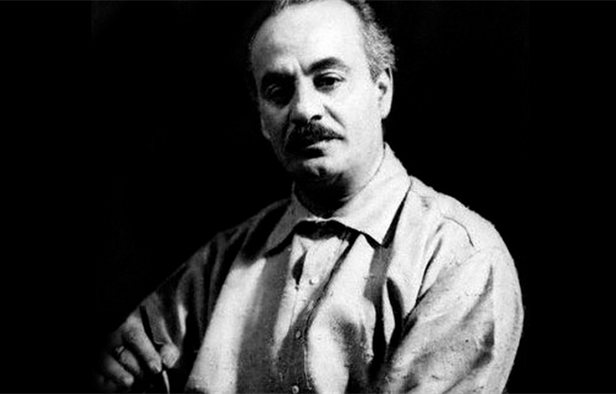Kahlil Gibran: The Prophet
with no religion

For beautiful minds that are seeking beauty, awakened souls, and authentic experiences, Lebanon has long been famous for two things: Khalil Gibran and its cedar trees (this is how foreign artists expressed their appreciation for this small land); for both were trying to embrace the wide skies, denying all limits, borders and chains as much as preserving their roots. You can never touch the unlimited unless you are deeply rooted in earth. That has always been the reason for courage.
Once again, Khalil Gibran is revived by his masterpiece, The Prophet, or which could be more accurately described as: a little piece of Heaven; a powerful creation from the beyond that shall never perish.
While watching the movie, you will find yourself in front of a touching story, filled with beautiful colors, and funny and insightful characters. You will feel yourself rapt in celestial music. Every now and then, you will inspect your melting heart and sense tears in your eyes. But above all, you will be overwhelmed by a mysterious urge to go back home and re-read the book, rediscover and relive it, for its intensity cannot be grasped in just a few minutes, even if it has been successfully illustrated. This is a movie that will lead you to read a book, how glorious! And herein resides its power.
Usually, movies lead you to carry on with life, to have lunch, or eat pizza. Some movies are pointless, and they leave you feeling empty inside. However, this movie is different. It is Gibran’s The Prophet, or rather it is Gibran himself hiding behind a fictitious character to escape from the calamities of religion. By this choice, he has made sure that Almustafa, the chosen and the beloved Prophet, will remain a flame that will lighten the darkness of ripe hearts, and will never transform into a dead scripture to be repeated unconsciously by fearful believers.
Only prophets are revolutionaries who can speak of the ultimate, the new, and defeat superstitions (before their own folks instilled their superstitions in them), and in Almustafa’s poetry you can smell the fragrance of freshness, which is especially expressed by his reverence for the new generations, our children who belong to “life itself.”
And only great masters cherish silence, consider it a real prayer and seek it, which gives Almitra (in the movie, Almitra is a little girl who has chosen silence and mischief to cover up her sadness) great significance and proves that Almustafa is not an ordinary poet—not even a philosopher—but much more. This can be seen in his consistency, tolerance, non-judgmental ways, sense of humor, and patience in the face of the injustice that is inflicted upon him. His nonviolence and longing for the “other shore,” are all signs that he is not merely playing with words, but calling in pieces of the unknown, pieces he doesn’t own for all valuable things “cannot be possessed.”
These glimpses and realizations of the infinite that Khalil Gibran experienced, momentarily, made him a prophet; it immersed him in the ocean of existence with unlimited joy. He has experienced the taste of freedom, of real freedom, that can never be but spiritual, and he has shared with us this delightful taste through his incomparable gift of writing.
For all his authenticity and being the sound of truth and compassion, Almustafa gathered around him all the simple people, peasants and farmers who still believe in the impossible, and who have rushed towards him to celebrate his release (or his transcendence). At the same time, he was seen as a threat to those in power who tremble at the sight of a real free human being amongst a blinded crowd. Nonetheless, nothing is able to dampen a soul that has transformed into a bright and strong flame, which allowed Almustafa to embark on his journey to return home, entrusting his heritage to those he knew would never undervalue or underestimate it (Almitra and her mother). These are the people who have believed in him, the ones who know the path of the heart. Khalil Gibran always believed in the power of women and this movie has captured this in an excellent way.




